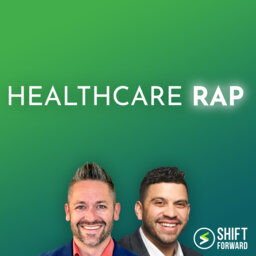2023 Predictions Series: Sara Vaezy & Barbara Casey
Healthcare Rap
Healthcare Rap is the leading podcast about consumer-centered care, a.k.a. how the frontiers of digital, retail, and traditional care can work togethe…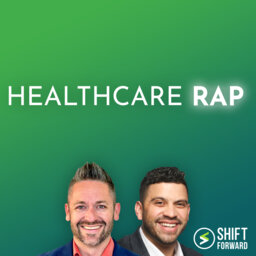 The State of Consumer Transformation (250th episode)43:53
The State of Consumer Transformation (250th episode)43:53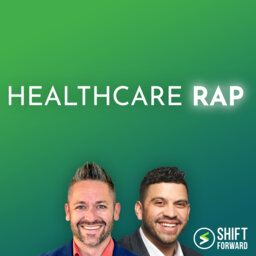 A Profile of Consumerism Leadership36:34
A Profile of Consumerism Leadership36:34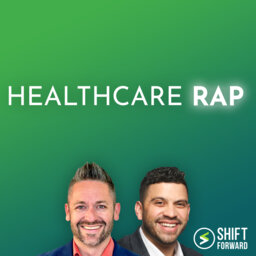 Priority Health and Kroger Health’s Vital Partnership27:27
Priority Health and Kroger Health’s Vital Partnership27:27 2023 Predictions Series: Jared, Zain & James36:09
2023 Predictions Series: Jared, Zain & James36:09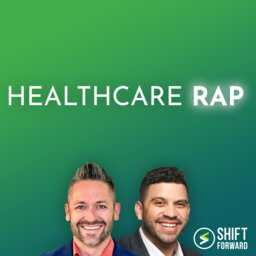 2023 Predictions Series: Paul Keckley & Chris Hemphill31:11
2023 Predictions Series: Paul Keckley & Chris Hemphill31:11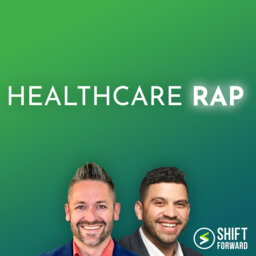 2023 Predictions Series: Jane Sarasohn-Kahn & Amy Heymans41:55
2023 Predictions Series: Jane Sarasohn-Kahn & Amy Heymans41:55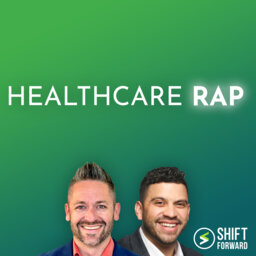 2023 Predictions Series: Sara Vaezy & Barbara Casey34:31
2023 Predictions Series: Sara Vaezy & Barbara Casey34:31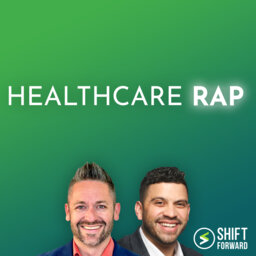 Geonetric, Tweet Chats, and Consumer Health's Bleeding Edge35:31
Geonetric, Tweet Chats, and Consumer Health's Bleeding Edge35:31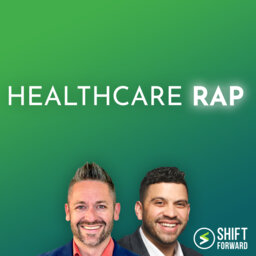 ChenMed’s CMIO On How Tech Enables Transformative Care22:42
ChenMed’s CMIO On How Tech Enables Transformative Care22:42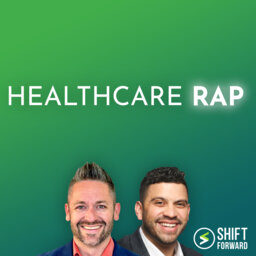 3 More Podcasts For Healthcare Leaders37:20
3 More Podcasts For Healthcare Leaders37:20 VillageMD’s CEO Dives Deep on the Summit Health Deal28:21
VillageMD’s CEO Dives Deep on the Summit Health Deal28:21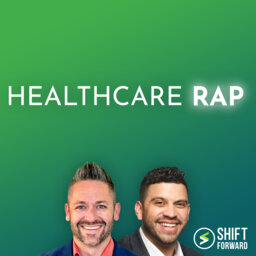 How to Humanize the Brand Experience34:32
How to Humanize the Brand Experience34:32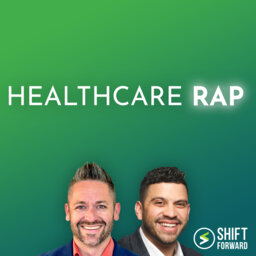 So You Think You Know How to Engage Patients?37:34
So You Think You Know How to Engage Patients?37:34
Sara Vaezy from Providence and Barbara Casey from Pixel Health kick off the 2023 Predictions Series to share their perspectives on what's coming for consumer transformation. They share how both traditional providers and disruptors are addressing the calls to become more consumer-centric, and what it all means for the industry and those whom we’re serving.
All that, plus the Flava of the Week about Almond, a startup that’s looking to modernize the OB/GYN experience. What does their membership-based model include, and can it improve access for this important aspect of healthcare?
This show is produced by Shift Forward Health, the channel for change makers. Subscribe to Shift Forward Health on your favorite podcast app, and you’ll be subscribed to our entire library of shows. See our full lineup at ShiftForwardHealth.com. One subscription, all the podcasts you need, all for free. (#244)
The show is here.
Yo, Our mission is clear. It's time to change health care. Have no fear. Today is the day. This is the hour together. You know we've got the power drop, the silos. We're all the same team experience. This is tech and marketing. How can anyone be satisfied with the way things have always been? Yeah, we tried. So join us now. Join the Revolution. Consumer First Health Is the revolution status quo or like status?
No. Yeah. This is the healthcare rep, y'all. Come on.
New choices, new platforms, new care models and the health care of tomorrow, consumers win. But who will design it? What will it look like and how long will it take? We are here to answer those questions with some provocative thinking about how to create the health care that people actually want. Ready to roll up your sleeves, Look at the world a little differently and explore the frontiers of consumer health together. Join us. This is the health care wrap. Welcome back. I'm your host, Jared Johnson. And here's what's going to go down today. We have the flavor of the week about Almond, a startup that's looking to modernize the Ob-Gyn experience. What does their membership based model include and can improve access for this important aspect of health care? I'll talk about that. Then we have the first of our 2023 Predictions series where we're inviting pairs of all star guests to share their predictions for consumer transformation in the coming year and beyond. This week, we welcome Sara from Providence and Barbara Casey from Pixel Health. Together, they give us a well informed view of how both traditional providers and disruptors are addressing the calls to become more consumer centric and what it all means for the industry and most importantly, those whom we serve. It's time to dive right in. Are you ready? Let's go.
Flavor of the week.
Are we getting closer to consumer First? OB gyn Care Almond is a digital health startup that's looking to modernize ob gyn, care for birthing people who want something more modern, full service and comprehensive than the standard provider offers. Co-Founder Tara Rafi said the patient experience today is slow, it's incomplete, and ultimately it's delivering not great outcomes. There's a very clear need for this. OB gyn is the second largest specialty by spend right after primary care, according to a 2020 report published in the Commonwealth Fund, 75% of women in the country are dissatisfied with their ob gyn care. So is this a Consumer first health service? Absolutely. Let's look at the four pillars of consumer First. Health first is the experience. According to TechCrunch, Allman's current offerings include pregnancy planning, birth control, counseling, infections, general wellness, period management and sexual health services. Prior to a patient's appointment, they'll fill out a health questionnaire and go over reasons for their visits so when they're being seen, it involves comprehensive conversations about the patient's health instead of a general assessment. The second pillar is the economics. According to UCLA health, the average cost for a general ob gyn visit in the US can range anywhere from 90 to $500 at almond. The cost of a general in-person visit without insurance is $300. They charge a $250 annual subscription fee and bill insurance for the visit and labs. The subscription provides patients access to the company's platform care team and personalized plans They want to emulate one medical's direct to consumer membership model. As many of you know, a one medical subscription provides access to 24/7 virtual care software, personalized plans and what it considers consistent quality care. Armond appears to be taking that same approach. The third pillar is digital a quick visit to their website find simple, icon based graphics and wording that emphasizes a new kind of care that is fresh, easy, organized and guided. Those are their words, and the digital experience tends to agree. It's easy to find the book a visit button on the home page, select the reason for your visit, and then choose virtual or in person. It appears that they're intentionally keeping the choices simple and limited, which usually helps. The last pillar is marketing. I don't have a good grasp on how Almond is reaching out and finding new patients, yet they have a small organic presence on Instagram and that's about it as far as their digital footprint. So I'll be following them as they hopefully have the opportunity to expand their marketing efforts. Bottom line, I hope to see more offerings like Almond as they provide hope in an area that frankly could use more care that's modern, easy and guided. Let's pay more attention to membership based specialty care as we design and optimize service lines. That's another way that we'll build the health care of tomorrow, and that's the flavor of the week.
The flow. The flow. The flow.
All right, everyone, let's get into the flow. This is super exciting. We're going to do a series of predictions episodes to wrap up the year, and each episode is going to have multiple guests. This is something we're trying new trying it for the first time, and I could not be more excited to get this series started off than with the two guests I've got today. I want to welcome Sara Ezy, Executive Vice President and Chief Strategy and digital officer for Providence. And I want to welcome Barbara Casey, who is the chief revenue officer at Pixel Health. Sara and Barbara, welcome to the podcast.
Thank you.
Thank you. Jared.
Let's break the ice here a little bit and if we can start off, Sara, what would you like them to know about you and your background and where you are right now?
Well, I would just say quickly, you know, I've been in health care for my whole practically 20 year career so far, and I absolutely love it. And in my spare time, I hang out with my family. And I also run a small family run hot sauce company that gives us a lot of spicy treats to eat. And a lot of fun at the farmers market.
All right. We'll dig into that here in just a second and I'll give Barbara a chance as well to fill in your bio. Barbara, what else would you like our listeners to know about you?
Oh, sure. I have a 30 year all health care background as well. About, oh, a third of it is in consulting. A third of it is in the industry, in the health care industry, and then a third of it is in tech. So it's kind of a good combo, I think, for for this topic.
Oh, well, I'm going to definitely agree on that. A lot of a lot of well-rounded perspectives here for sure. So. All right. So I mentioned we get back into the hot sauce. Sarah, tell us about that. Are there you know, I'm thinking like the holiday season's coming up. Are there like best sellers here? Like, what kind of treats are we talking about?
Yeah, we've got three different sauces. Two of them are made with habaneros. One is like a roasted Nero. That's our original and my favorite. And then we've got a blueberry habanero that's like a little bit of, like, sweet heat. And then we do a jalapeno, fresh jalapeno that's a lot milder. So we do sell, like, holiday three packs if folks like that kind of thing. And they're all natural. So I highly recommend them.
That sounds super fun. And then, Barbara, what tell us about a passion of yours outside of work as well. What do you do when you're not splitting your time with with all the things going on in health care?
Well, I love to cook too, so I might have to call Sara and get some of that hot sauce I make, especially this time of year in the fall, I end up making all kinds of soups. And so I have threatened with my son to go into the soup business. So maybe need to get some tips and tricks from my co-host here.
Is there a favorite soup on your palate? Like if you had to, you know, narrow down to 1 or 2? Do you have some favorites?
My kids request time and time again the white chicken chili that we make. So then we all make it now. And it's it's really delicious. So that's a favorite.
I'm getting hungry.
Yeah, We could do, like a spinoff series at some point. You know, the health care cook off or something.
Yeah. The white chicken chili with with the hot sauce. Okay.
This really was a good way to start off the show. This this is good stuff. So tell you what, let's dig into this whole predictions. Thought so what we wanted to do today is just have a little bit of fun and offer some predictions for 2023. We've got this new year coming up and we wanted to focus on digital innovation. This is based on what the two of you are seeing and and also where you'd like to see the industry go. I think it's important to think through both. There was an exercise that I just went through a week ago with an online community, and it was really interesting to me because it was a design thinking exercise. But we also talked about not just the current state of things, but we talked about a future state. And we had these two lists of Post-it notes side by side and having two visual cues side by side like these lists of Post-it notes just really brought it to bear for me to to realize some future state thinking is really helpful, especially when it's right next to what we see going on day to day. So we don't get lost in that. We also see kind of a direction for it. And so that's what this is intended is just some some things to think about. But I'm very curious. I'd love to just hear what the two of you are thinking about in terms of where digital innovation is going. Like what trends might you expect to see? And maybe we can start with health systems and hospitals. Sorry, do you want to go first on this one and then. Barbara?
Sure. And you know, this is a pretty broad topic, so I think I'll focus my comments in a couple of areas. The first, you know, uniquely from the perspective of the provider sector, we are you know, the bottom fell out essentially on health system and provider financials this year. And so I think we're you know, and we're already seeing this to some extent, but the implications and how they play out in 2023 will be really interesting. A real sort of swinging back toward the notion of supporting the core, the core business and of what health systems do. And that can be both good and bad, right? A lot of. Times that that thinking in and of itself can, you know, create some consternation because it seems like we may not be making progress in the way that we would necessarily want to. Now, I don't think that's necessarily true. Like just being really good at the core thing that you do is actually great. And I think we will see a lot of that, like just just that swing back toward getting really focused on driving high quality, high care within a health system. Now, what that doesn't do is prepare us for change as it relates to like the disruptive environment that's out there. So I think there's significant risk associated with doing that, but it never hurts to be really good at your core. So, you know, I think we're going to see that and what that means like from a digital perspective, I anticipate and we're already again, we're already seeing some of this, that there is going to be a tremendous pullback, especially as it relates to sort of ill defined concepts around digital health or like a lot of, you know, I've seen a lot of like dabbling in digital and without a clear thesis around like, what are you trying to drive when it comes to digital transformation within an organization? And so we're going to see, I think, a pullback in that, that since health systems are such a major buyer segment of a lot of the digital companies that are digital health companies that are out there, I think that's going to have, you know, sort of a downstream like cascading effect where, again, we're already seeing this where companies, their revenue is going to go down. I think a lot are going to really struggle to sustain. And that's irrespective of like what's happening in the sort of funding environment. And we're already seeing it kind of go back down to slight growth post 2019 levels, but definitely down from 2020 and 2021. So a pullback and there's been a tremendous amount of defunding or scaling back of digital health teams. A lot of my digital, digital, you know, colleagues throughout the health system sector, again, they've left and moved on to other things or their teams have been disbanded. So I think we're going to see a lot more of that and that's concerning. Now on the other side of things, I think there will be a major push toward demonstrating value and ask to demonstrate value through digital. Like we internally, we've been adopting this sort of return on digital investment metric, we call it. And so actually being able to say like what incremental value? And that's really hard in a health system environment. But what incremental value are you getting from your new channels and modalities and what's the delta between that and the legacy systems and structures that you have in place? And actually being able to quantify? Is it really powerful for us? And I think we're going to see a lot more of that going forward, hopefully. And so that will drive a lot of, I would say, discipline and rigor in the broader market for the solution companies out there as well to be able to demonstrate that and not just all take credit for the same kind of high level potential outcomes that we've seen in the past. And that leads me to the last thing, which I think not everybody is is going to be able to do that. And so we're going to see, I think, a lot of consolidation of those companies in a few different spaces. And one of the spaces that is very near and dear to my heart because it's where we do with the vast majority of our work is around identity driven engagement. There are tons and tons of companies out there that do engagement work with varying theses around what levers they're trying to pull and what kind of outcomes they are going for. But they're not all created equal and they all have different kind of approaches to the problem and they can't all demonstrate value. And I think we'll see a big kind of contraction or a consolidation around that space.
Excellent. Barbara, what do you think?
Gosh, this well, it's a lot to play off of and respond to. I agree. I especially love your comments, Sara, about the identity, because I think, too, that I agree that that's a huge issue that's required for just more pure personalization. If we're going to have personalization, it has to be with a much better construct around patient identity and the more digital health products that are out there and the more solutions or even point solutions that health systems are trying to deploy without that strong center of identity to pull it all together, it's still it's going to be very disjointed, I think, to the consumer. One of the things that I sort of had on my list was really about the workforce, that, you know, the workforce has taken such a hit and a toll with the pandemic and come. Out of that and now facing the triple Demick and other things that the country is facing right now. The the workforce is just extremely weary. And I think going back to supporting the core, I think there is going to be a lot more emphasis on how do we really digitize the care experiences of the inpatient teams and the care teams in the hospital and how do we make their experience of delivering care, you know, much more digitally enabled and streamlined so that just their burnout and ease of use really changes? Because think it's been in lots of organizations, there's a zeitgeist of this that think they're doing it right now, but it's not very easy to do for all of the care team to have a mobile device in their hand, for example, to really be able to to take care of patients and do so in such a way that their digital solutions are extremely embedded in their workflows and very intuitive. That's something that I think would make a lot of sense. And it also would drive kind of that going back to their knitting and redoing workflows so that they are much more streamlined and and as well as being high quality and supporting patient safety. So I think that's one in particular. On the workforce side, I also think that physicians, you know, we might even see more concierge medicine or even no insurance practices because think they're also at such a burnout point that there may be a sort of increase in that kind of a care model. And then think in terms of just overall automation, I do see more automation happening in the hospital, in the health system. Obviously, we've had it for a long time. There has been RPA and revenue cycle and I certainly exist in a number of places, but definitely growing and growing its utility think and the ability to really support the providers in the environment, but also a lot more operational automation in hospitals. I think there are a lot of robots, for example, but think there's even going to be more of those and probably some solutions that manage the robot fleets would be even more prolific, like cloud based software, for example. That really helps the administration and management operationalization of those robotic fleets in the hospital and just doing more things. So think those three things, you know, really help support that how to how to arm the workforce with just more time and helping to make their experience of delivering care just more enjoyable.
Well, yeah, it'll be interesting to see how that does. Like you say, streamline the care itself and the work that it takes to provide that care. I'm going to compare and contrast that a little bit to what we see from what we've referred to as disruptors, capital disruptors and other new entrants. So the ones we talk about a lot on this show, big tech, big retail, other non-traditional entrants, they're just swooping in and taking, you know, some part of the value chain. They're not trying to compete directly with hospitals. They're, you know, the primary care startups, the providers, you know, everyone out there. I imagine we're going to see some things that are similar, some similar challenges that they're facing, but also a lot of different directions. Barbara, can we start with you on this one? What do you expect to see from disruptors and new entrants next year?
Yeah, and you hit it, Jared. I mean, primary care, I feel like that's the area that's the most apt to be disrupted, especially in like the next year because it's already started, you know, with emphasis on virtual care and all the ways to do that. That really opens up all kinds of possibilities, I think with the increase in the non-traditional players in primary care and of course increasing costs and physician shortages, the real wave of consumerism and and digital disruption, I mean, all of those things really put pressure on the traditional models, which I think is why we're seeing more disruption in that space. I think it's interesting, you know, kind of to simplify it, it's probably an oversimplification, but think about it like it's going to be Amazon and some of the big CVS, Walgreens and all of that on the on the coasts. And while Walmart in the middle of the country, you know that it would be kind of those players that would really emerge and with all the private equity investment in primary care and just physician practices in general, you know, that really starts to pave the way for this commoditization of primary care, at least at that very transactional level and even urgent care feel like, you know, those two things are pretty commoditized. So I think where health systems actually have an opportunity to really differentiate themselves is if they do stratify where they can play in primary care and where they can do a job that probably some of these retail and tech giants cannot. It's really. That chronic disease care and stepping up the game as it relates to geriatric care or dealing with patients who have multiple chronic diseases. And think about the primary care practice that really has the star. Internists think creating more leverage for those internists and really having a I would say, a differentiator or just a good quality ability to deliver really great quality to help people manage their care when they have multiple chronic diseases. It's pretty tough if you've got COPD, hypertension and diabetes. If you think about the digital health tools that are available to those individuals, they might have three different applications that they have to log information in every day and possibly three different nurses or caseworkers or somebody calling them from multiple sources and multiple organizations. That's not sustainable. Think a health system could really help to create programmatic elements that would create much more streamlined and efficient care for those individuals that are experiencing multiple chronic diseases.
Well, like you said, Barbara, it's not only not sustainable, it might not be the best path long term anyway, to have that level of coordination with care for especially for for those with chronic conditions, like you said. So yeah, yeah. Really interesting thoughts there. So where do you want to go with this one?
I love the concept of segmentation around sort of product lines and I do think that that will continue. So I fully agree with with Barbara on that. And and I think that's really powerful. And what that means is essentially like sort of I think the disruptors, which you said something interesting, Jared, which you were like, you know, they're not really competing like with the core business of a health system. And I would say I, I agree with you around like big retail slash, big customer, you know, that's Amazon or Walmart or CVS, although I do think that the pay writers are in a bit of a different category and do pose kind of a different competitive risk associated with them. But I love that they are going down this segmented path and I think that that can mean, you know, that can be really powerful because we really get close to the customer with a model like that because it really serves their needs. And I think those non traditional sort of non health health system players will bring a different discipline around. How do you operate with respect to knowing the customer when you are operating in a decentralized care delivery environment? So they're going to keep fragmenting the environment and decentralizing it to these product lines that they own, that they get really, really good at. And then let's take the example, for instance, at the third party marketplace that Amazon has, Amazon doesn't own every single thing that they sell on their website, right? They tap into the third party marketplace. And I think that concept and the mechanism by which you do that through knowing your user, knowing your customer and then being able to serve them in that decentralized environment is where they will focus. And to Barbara's point, which I completely agree with her, I think that poses a really interesting opportunity for our like the incumbent players to, one, to be, you know, to kind of double down on the areas that we know better what the user like because of the depth of data and sort of the real time ness of the data that we have access to as well as like sort of the full funnel, we can know folks more deeply and then we can also be good partners for where we may not be best positioned to serve somebody, right? I mean, if you have a pharmacy right across, you know, down the corner from down the street, from you on the corner, that may be a really great place for you to get certain aspects of your care and, you know, sort of more community model of care. And so I think all of these factors will come together with some of the expertise and discipline of these these companies that really think about it from like a consumer orientation ecosystem orientation. And then and I'm excited for that. And they and then they can go deep in certain areas. I don't think we should fight it at all. I think that we need a much more product oriented mentality when it comes to care delivery rather than like a loose collection of services that frankly, we struggle with delivering on a really high quality experience that way and creating a partnership framework that allows for like a healthy economic model, that allows for the flow of information in a way that supports getting close to the consumer and meeting their needs.
Yeah, I so agree with that because my first thought is partner, I think that's if Amazon is coming into your market, think it's better just to partner with them for the things that they want to do as opposed to trying to head on head compete in some ways. The other thing. Curious as to what you're seeing in this space. Had another thought about this that I see, and I don't know how to articulate it, maybe, but it seems like especially for health equity, there are blurring lines between what I would call community resources and support and health, you know, and really trying to bridge some of the social determinants of health and even the transitions of care. And what I mean by that, there are some digital applications that I've been looking into that are really purpose built for certain populations in large urban areas or even other places that are really trying to connect those populations to specific resources. And it's blurring between like health and food and nutrition and education, you know, just all these different kinds of community sources. And so how guess for health systems, how do you better integrate with those kinds of solutions so that we are achieving that health equity so that that could be a whole area of disruption in the next few years that I sort of see.
I agree. I think it'll be a huge area of disruption. And it's an interesting area because I think one, there's sort of like the first wave of disruption, which is like, who does it right? Is it the health system that tries to orchestrate all of it or is it these other providers? And I think we're I think we're still to some extent within that first wave and hopefully we'll be out of it. I may have an unpopular opinion, which is that I don't think health systems are the best deliverers of those services, but we do have an understanding of who individuals are. Often, though in some cases we even don't. So we may not even be the appropriate orchestrator at the community level though. Then the question becomes, well, then what's the alternative? So I think, you know, but we often health systems try to own everything themselves. So I think we're hopefully getting past that phase where we're doing that and we're much more again, in a partnership orientation that's wave one. Then we have to, I think fundamentally becomes like, how does that information get shared and utilize? And then what is the actual, again, like the economic model behind it? And I think that one of the really interesting areas of disruption in this space is actually going to be how platforms that connect folks to resources can also be a mechanism for funds flow and financing of solutions that often don't get credit for the value that they have in people's health. So like social services agencies and things like that that are, you know, sort of grant funded or government funded at various levels, but don't really get the full credit for the contribution that they make to the health of an individual. I think that could be a really interesting evolution, which is that the technology becomes almost like a a funds flow mechanism like broker to do that. So we'll see if that pans out. I'll probably be proven wrong post-haste here.
Well, well, at the very least, it's a perspective that we don't hear that much about. You know, we hear a lot of other things dominating the headlines. And that kind of makes me even curious what the two of you would think about this. Would you want to predict what brand outside, big tech, big retail, whatever, what brand that will be talking about the most in the next 12 months? Sorry, What do you think? That's such a good question.
I think we will be talking a lot about the providers and in particular the sort of massive imbalance and issues with distribution of value in the whole industry. And I think it's almost like a tale of two cities. It's hospital financials or they've had their worst performance in decades. Meanwhile, insurers and providers are doing the best that they've ever done. And that tale of two cities, I think we're going to keep hearing about it, especially in the context of of the pay writers and getting that sort of keen eye on what does that really mean? So I think that's going to be a big one because they really are material in terms of where the activity and the dollars are in health care like Amazon and the innovation venture community, they all they may get a lot of hype, but like when we really think about it, the vast majority of care in the United States is delivered by health systems and then the big insurance companies are doing all the sort of financial machinations on the back end. And that's functionally how it all comes together. Nothing else really operates at scale, and I think that that's going to be more and more important going forward.
Very interesting. Barbara, what do you think?
So what brand I was thinking Apple, just because I think one of their latest releases, they were talking about even more encroachment into the health care system and just more that they want to do to power. Individual's health, but also feel like get more involved in even the operations are administration mean think there was an article I read recently that was Apple will own or have its own provider capabilities within the next five years was a prediction so think that's a good one and then keep thinking about I know that hospital at home became so huge and so many more investments were being made there by health systems. But to Saras earlier point, there's probably less less money to invest these days. But when you ask that question, I was thinking about like a Best Buy and it's it's model with current health just thinking about you know and that's a brand. But don't there certainly are a lot of organizations out there doing a great job with hospital at home type care you know even health systems own branded versions of that. I can think of many examples, but I do think sort of the idea of of hospital at home will just continue to grow because think it's in many times in the consumer's best interest as well as preference to have any services that they could in the comfort of their own home. As we all know, we probably recover better at home once we get what we need from the hospital. Think getting home is is a huge piece of the recovery. So I think the more that we can use technology to create that kind of an experience, the better.
Lastly here, what do you hope is the net result of all these trends, all the things we're talking about? So where do you hope it gets us? I guess as an industry and as a society in the next 12 months, if some of these things do happen the way that we think they might bear out. Barbara, let's start with you on this one and then Sarah.
You know, obviously, I think and I think, Sarah, I've had conversations with her about this, I think bringing care to the consumer, to the patient, really meeting them where they are. We for so long in this industry have forced individuals, consumers, patients, families to kind of do business the way that the health care organization wanted them to do business. And many times, as I have looked at organizations and tried to create change, it's mostly because the processes and, you know, the hoops, if you will, the settings, everything was orchestrated to serve the hospital in many cases, or the doctors or it was to serve that entity and the billing practices, etcetera. All of those things. I think in the last five years or so, maybe ten years, there has been just much more of an emphasis on how do we really bring care to the patient and the consumer in the way that they want to be served. And in order to do that, we talked about segmentation and stratification. There's so many different individuals out there who want to consume health care very differently. And so how do we create a flexible and decentralized, abstracted or almost virtualized health care model so that everyone can get care exactly the the way that they want to? And I believe fundamentally that the digital aspects of that care model are so important. And so if we do contract, as we've kind of predicted here, if that contracts and health systems are spending less on that, I still hope that it will continue on in some form or fashion because I do think that's what individuals want is really to be to be known, right? Know me and let me know that you know me and allow me to get that care in the way that it best fits in in my life.
I concur fully. I don't know how much I have to add to that other than I agree with everything Barbara said. I think better consumer experience that's personalized, tailored to individual's needs as opposed to, you know, sort of the construct of the incumbents and how we are built or operated. And then I would maybe add affordability, so personalized, affordable, consumer centered. That's what I hope we end up with.
Outstanding. Well, it's Sara as chief digital and strategy officer at Providence. Barbara Casey, chief revenue officer at Pixel Health. Thank you both for joining us today.
Thanks for having us.
Thank you. Jared.
Thanks for tuning in. If you like what you heard, please spread the word. Tell your colleagues to tune in for all the awesomeness, then leave a review on Apple, Spotify or wherever you listen. This show is produced by Shift Forward Health The Channel for Change Makers. Subscribe to Shift Forward Health on your favorite podcast app and you'll be subscribed to our entire library of shows. See our full lineup at Shift Forward Health one subscription all the podcasts you need and it's all for free. And remember, we might have a lot of work to do in health care, but we'll get there faster together. Thanks again.
 Shift Forward Health
Shift Forward Health